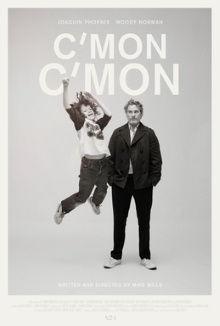So this is a case where I absolutely agree that director Mike Mills has made an incredible film and yet this is the kind of film that doesn’t accord well with my own tastes. The theme here is communication, specifically of the verbal kind to express one’s thoughts and emotions, and so this film really is all about talking. To facilitate this, the film actually deemphasizes its visuals so as to be as unobtrusive as possible and I believe it was shot in black-in-white for that reason. The result is a work that perfectly delivers on what the director set out to accomplish but is also about listening to people talk to such an extent that it’s off-putting to me personally.
Johnny is a radio journalist whose current project has him travelling across many different US cities to interview children about their feelings and thoughts about the future. He speaks to his sister Viv for the first time since the death of their mother a year ago. She needs help with her son Jesse as she wants to help her estranged husband Paul with his mental health issues. At first Johnny stays with Jesse in Los Angeles and though Jesse refuses to talk about himself, he seems fascinated by his uncle’s recording equipment and takes to carrying it everywhere to record sounds around him. But when Viv needs more time, Johnny takes Jesse with him to his work in New York. Jesse is delighted but also tests Johnny’s patience and commitment by pretending to be lost. Over the phone, Viv gives some advice on how to deal with Jesse which seems to help. When Johnny next needs to go to New Orleans for the next set of interviews, he decides to send Jesse back to Los Angeles. But Jesse resists and becomes attached to him.
The film opens with the interviews of many different kids expressing themselves and pretty much has these go on for the entire running time. Part of the routine of Johnny taking care of Jesse includes reading bedtime stories to him and he also reads excerpts of various real books that offer advice on parenting and communicating. That adds up to a lot of talking and it’s not really about any topic or theme in particular. The point is that it simply is important to get people started on talking in the first place to express their emotions and to let them know that they are being heard. I believe the intent is to contrast to earlier times when people were more reluctant to open up about themselves and tended to keep their feelings bottled up. Encouraging people to express themselves in healthy ways therefore leads to improved mental wellness and stronger relationships. The effort takes time and a tremendous amount of patience but as the case with Jesse proves, it is rewarding in the end. I especially love how Jesses like to go “blah blah blah” in a dismissive way as if to say that all talk is just words. But as their strengthening bond proves, “blah blah blah” is at the same time just words but also more than words as the conversations and talks and storytelling sessions builds on itself to grow their trust and love for each other until both feel comfortable enough to share their innermost thoughts and misgivings.
The film’s total commitment to its message is admirable. There are hints that Johnny urged Viv to leave her husband when his mental problems first manifested, thus inadvertently damaging Jesse’s childhood. This can be interpreted as the Johnny of the past being too ready to take action and too unwilling to just listen. The outpourings of most of the kids aren’t really that fascinating or insightful but the point is that they ought to get the chance to express them anyway. At the same time, I must confess that the excessive amount of “blah blah blah” about nothing in particular really personally irritates me. I believe that the film’s visuals are even deliberated left understated in order to enhance the importance of verbal communication. This is absolutely the right choice to make given the theme but I prefer films being primarily visual experiences if at all possible. It is rather a shame that Johnny and Jesse have their talks in many different interesting places but the camera actively tries to make sure that the backdrops don’t stand out too much.
My opinion on this film therefore is that it is really good and Mills is a director worth paying attention to. I’m always especially impressed if the director is also the scriptwriter as is the case here. I also have no idea how he managed to get this great performance from child actor Woody Norman who plays Jesse. Yet this still isn’t the kind of film I personally enjoy so it’s not going onto my list of favorites.
